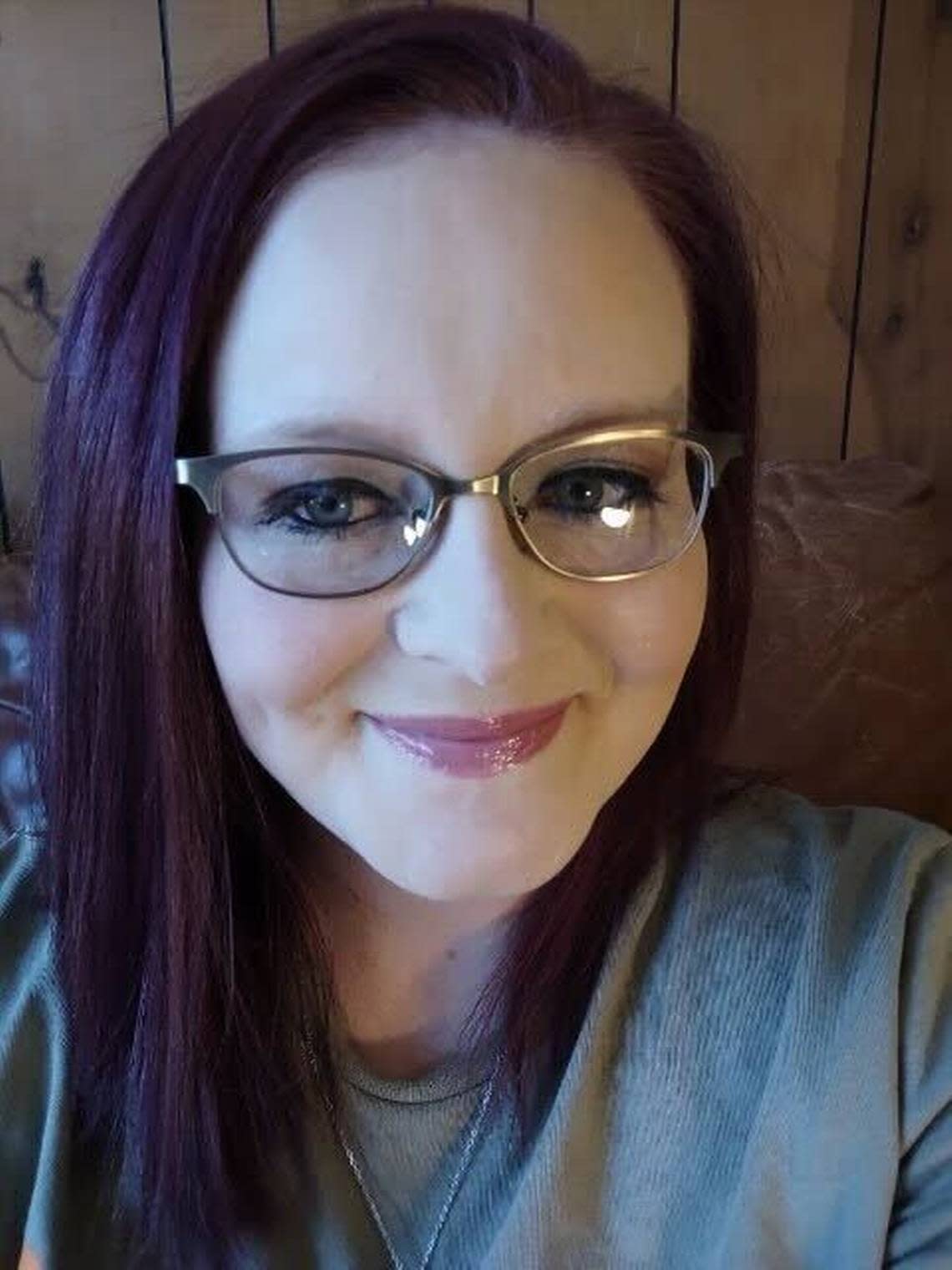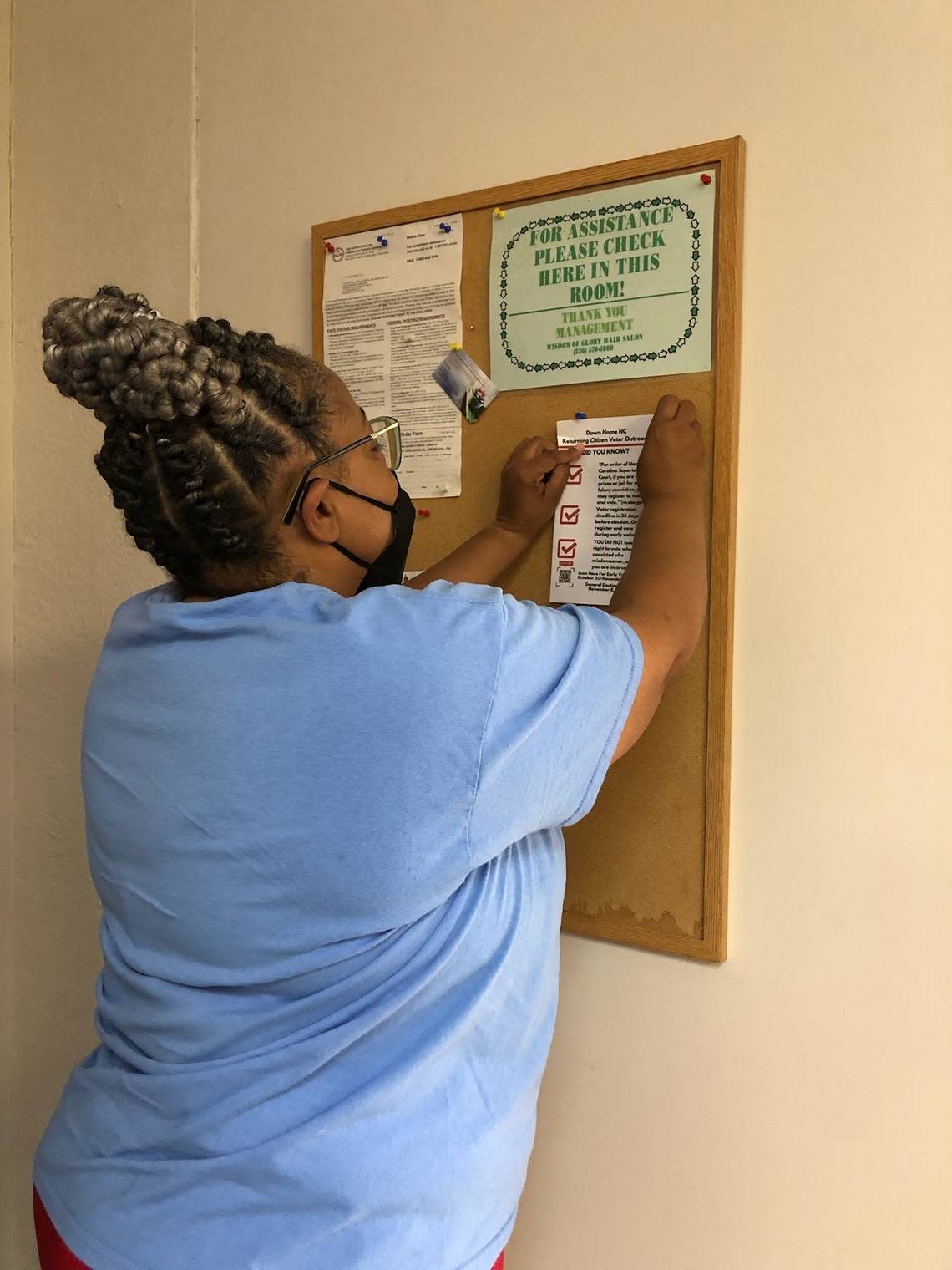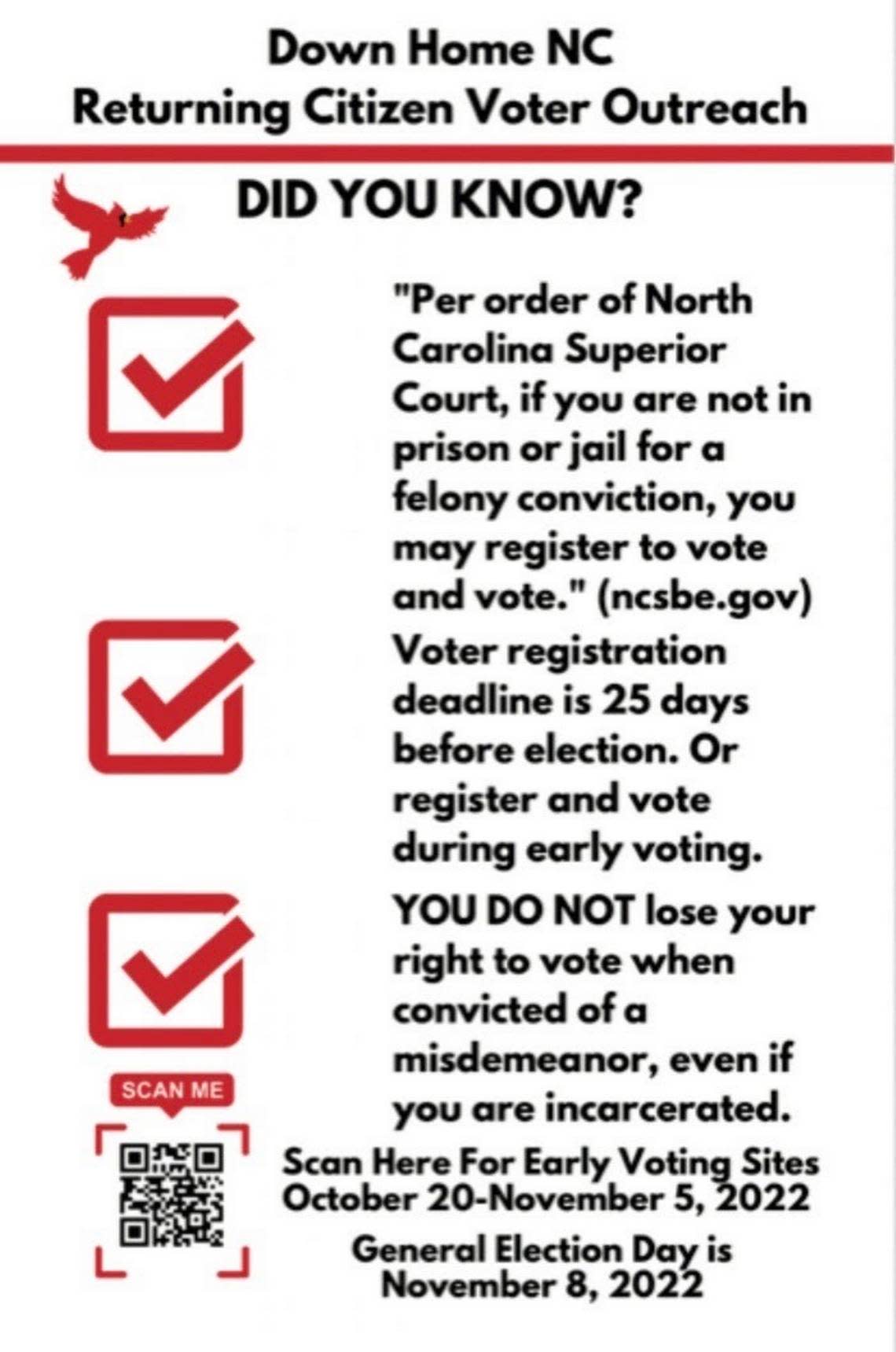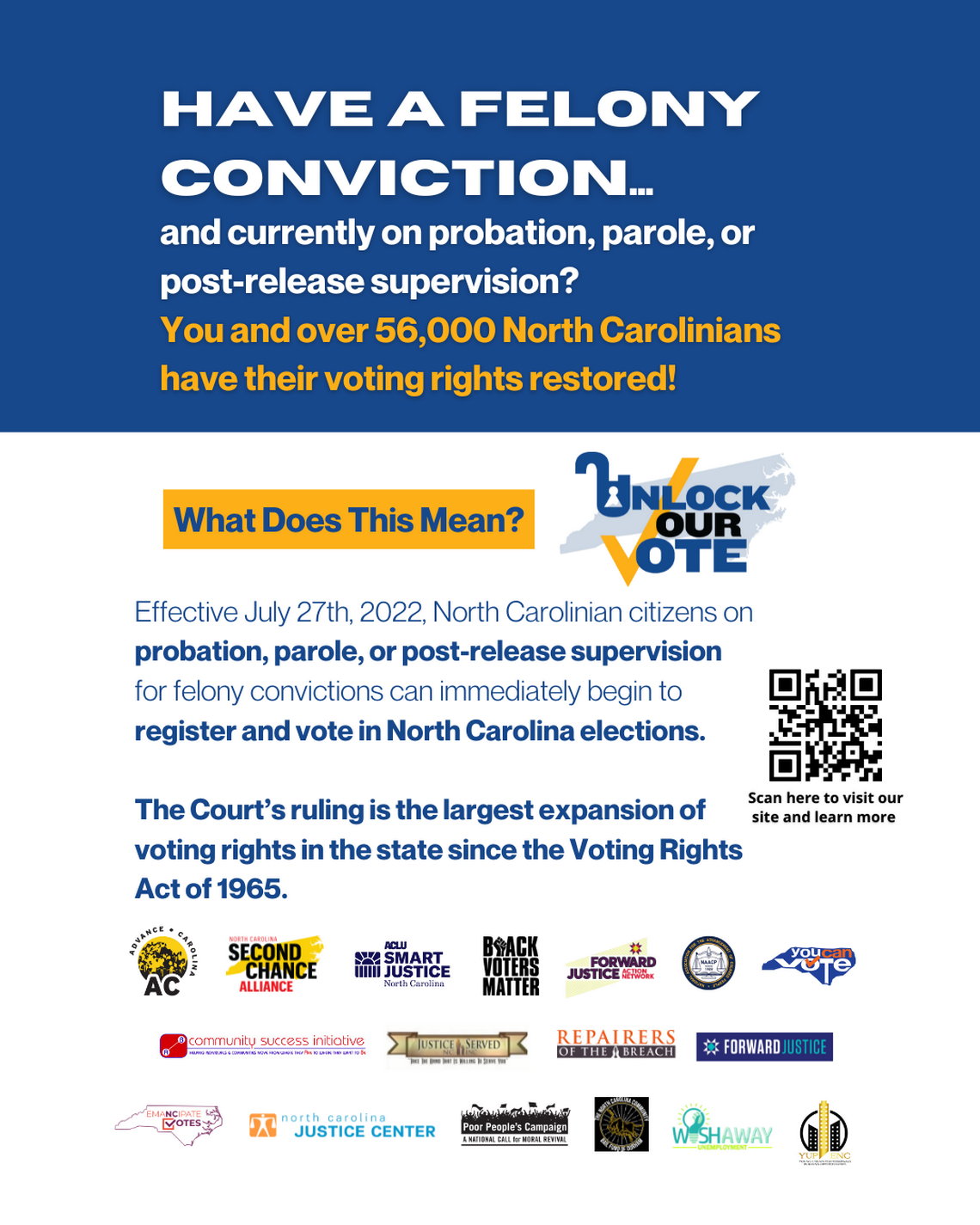She had the right to vote in NC and didn’t know it. Now she’s spreading the word.
The letter arrived just days after Tiffany Stamm’s court hearing.
While her drug conviction hadn’t put her behind bars, it had cost her the right to vote. The letter in her mail notified her that she had lost that right.
“I just thought, how can they take our most basic human rights away?” Stamm said.
That was five years ago. She had sold her medication to an undercover cop for money to pay her bills, she said. She was convicted of a Class I felony, the lowest level, and sentenced to 30 months of probation.
Now 30 and recovering from drug addiction, Stamm reflected on that time.
“I was in a bad place in my life; I was not a bad person. And even the people who have more than one felony, it doesn’t matter; that is one of our most basic human rights for our voice to be heard. And they took it away, and it’s absolutely not OK,” she said.

On July 27, following years of back-and-forth court rulings, appeals and counter-appeals, thousands of formerly incarcerated North Carolina residents serving a felony sentence became eligible to register to vote.
An estimated 40,000 North Carolinians became eligible to register and vote as a result of the court order, according to Patrick Gannon, spokesperson for the North Carolina State Board of Elections.
Previously, under North Carolina law, a person serving a felony sentence could not register to vote even if out of prison until they completed their sentence, including any period of probation, parole, or post-release supervision. They also had to pay all legal financial obligations before they could vote.
Stamm became eligible to register to vote when she finished her probation period. But, “I wasn’t told that,” she said. She only found out she was eligible through Down Home North Carolina, a statewide rural organizing group that organizes canvassing efforts and generally endorses candidates who are Democrats.
“They told me and I was so freaking happy,” said Stamm, who has worked as a canvasser with Down Home NC for the past three weeks.
Members of advocacy groups are pushing to make sure those newly enfranchised people get the chance to use their new rights. They work to make sure information is clear and accessible to North Carolinians and register people serving a felony sentence who are not in prison or jail. Now they are turning their efforts to promoting early voting.
Early in-person voting runs from Oct. 20 to Nov. 5. It permits people who missed last week’s voter registration deadline — which applies to voting on Election Day itself, or voting by mail — to cast a ballot at an early voting site, and if they haven’t registered, to register that same day and vote.
Knocking on doors to find voters
The Rev. Donna VanHook, a Down Home North Carolina fellow and an associate pastor at a church in Burlington, where she helps connect people with local resources, has been knocking on doors in Alamance County since late September. Last week, she went to barber and beauty shops.

VanHook also worked as a police officer for over five years and ran unsuccessfully to be Burlington’s mayor last year.
VanHook said the team of canvassers in Alamance consists of about 20 to 30 people who went to areas with marginalized populations. There, they’d often find people who had previously been in jail or prison and were serving a felony sentence, she said.
“They’re still confused about it, as this is new,” VanHook said. She and her teammates have been handing out fliers to people explaining their rights. The fliers also have a QR — quick response — code, which directs people, after scanning it with their phones, to early voting locations pinpointed by the state elections board.
“What we’re trying to do is bring the right information to people,” said VanHook. The back-and-forth rulings further muddled clarity, she said.

In 2019, a lawsuit known as Community Success Initiative v. Moore was filed by a coalition of nonprofits challenging the North Carolina law restricting voting by felons.
On April 26, the N.C. Court of Appeals ruled that felons could not vote during the May primary and July 26 elections. But starting July 27 after these two elections, the appeals court ruled, a previous ruling by a superior court granting North Carolinians with prior felony convictions the right to register and vote, must take effect.
Since the appeal court ruling came down, Daquan Peters, coordinator of Second Chance Alliance-New Hanover County, has been out in his community every day to speak with people, explain their voting rights and register them to vote, he said. Most recently, his chapter held a voter registration drive that provided food to over 150 people, checked their voter registration status and registered them if needed.

Second Chance Alliance is a statewide organization that works to address the causes of criminal records and the barriers they create to successful reentry.
In his conversations in New Hanover, many people tell him they distrust the political system and the registration process.
“What would anybody feel if they’ve never had a chance to participate in a democracy? ... They are going to feel distrust,” Peters said.
And while registering people serving a felony sentence who are not in prison or jail is a priority, his chapter is also largely “going above and beyond to make sure our individuals in our community, that are unregistered, period, that are living in low-income communities,” register, participate in politics and get information, he said.
Black voters
Peters and VanHook both said they would now shift focus from registration to promoting early voting.
VanHook said Black voters in North Carolina, who are often marginalized and affected heavily by the criminal justice system, often prefer to vote early.
In particular, many Black North Carolinians vote as part of events like “Souls to the Polls,” which are faith-based rallies that push for residents to vote en masse, she said.
According to NCSBE data, in 2020, during the last presidential election, 65% of people voted via one-stop early voting, and in 2016, 62%.
The Sentencing Project, an advocacy group working to reduce incarceration, argued in a brief as part of the 2019 lawsuit that conviction-based voter disenfranchisement in the state disproportionately impacts Black Americans.
“Of the more than 56,000 people currently barred from voting because they are still under post-conviction supervision, 42% are Black. Yet Blacks account for only 22% of the state’s total population,” they wrote.
Outdated forms
The superior court’s ruling is not final, as previously reported by The News & Observer. In May, the state Supreme Court agreed to take over the lawsuit rather than wait for the appeals judges to decide whether it was right for the superior court to loosen restrictions, The Associated Press reported.
But, for this election, residents serving a felony sentence out of prison or jail may vote.
The NCSBE, on its website, explains that voter registration forms in the state are being updated to account for the rule change, and county boards of elections have also been instructed to accept voter registration forms with outdated language.
For Vanhook, the distribution of the outdated forms is concerning. “It’s very important we have the correct information out there,” she said.
Gannon wrote in an email that the NCSBE provides paper voter registration applications throughout the year to numerous agencies and groups — including county boards of elections, social services agencies, libraries, high schools, and private groups conducting voter drives — and that it’s estimated that hundreds of thousands of the outdated forms, shared prior to the court-initiated updates, are in circulation in the state.
“The wide distribution of such forms, especially among groups that the State Board does not supervise, combined with the national paper shortage, made it impossible to completely replace forms in circulation after the felon eligibility change on July 27,” Gannon wrote.
Still, he said, the NCSBE was not aware of any issues with county boards of elections accepting the forms.
He also wrote that some advocacy groups have expressed concern that the outdated language may result in people serving felony sentences not registering to vote. To address this, the NCSBE updated the forms on its website and worked to get hundreds of thousands of copies of the applications with the new language printed and sent to agencies and groups that register voters, Gannon wrote.
For more North Carolina government and politics news, subscribe to the Under the Dome politics newsletter from The News & Observer and the NC Insider and follow our weekly Under the Dome podcast at campsite.bio/underthedome or wherever you get your podcasts.






